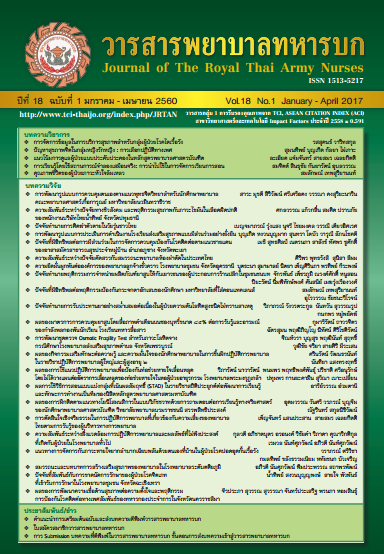การตัดสินใจเชิงจริยธรรมในการปฏิบัติการพยาบาลที่เกี่ยวข้อง กับความเสี่ยงของพยาบาลไทยตามการรับรู้ของผู้บริหารทางการพยาบาล
Keywords:
การตัดสินใจเชิงจริยธรรม, ความเสี่ยงในการปฏิบัติการพยาบาล, การรับรู้ของผู้บริหารการพยาบาล, Ethical judgment, Nursing practice, Nursing administratorsAbstract
วัตถุประสงค์การวิจัยเพื่อศึกษาประเด็นจริยธรรมที่เกี่ยวกับความเสี่ยงและการตัดสินใจเชิงจริยธรรมที่เกี่ยวกับความเสี่ยงในการปฏิบัติการพยาบาลของพยาบาลตามการรับรู้ของผู้บริหารทางการพยาบาลการออกแบบการวิจัยเป็นการวิจัยเชิงคุณภาพคัดเลือกกลุ่มตัวอย่างแบบเจาะจงตามคุณสมบัติที่กำหนด ผู้บริหารทางการพยาบาลที่เต็มใจเข้าร่วมการศึกษานี้จำนวน 36 รายเก็บรวบรวมข้อมูลโดยการสนทนากลุ่มพร้อมศึกษารายงานการบันทึกกรณีศึกษา วิเคราะห์ข้อมูลโดยใช้วิธีการวิเคราะห์ข้อมูลเชิงเนื้อหาผลการวิจัยพบว่า ผลจริยธรรมวิชาชีพที่เกี่ยวกับความเสี่ยงที่พยาบาลส่วนใหญ่ปฏิบัติขณะทำงานในบทบาทหน้าที่พยาบาลตามมุมมองของผู้บริหารทางการพยาบาลมีจำนวน 7 ประเด็นความสำคัญตามลำดับคือประเด็นจริยธรรมที่มีความเสี่ยงด้านต่างๆดังนี้ 1) การให้ข้อมูลการสื่อสาร 2) การประเมินอาการไม่ถูกต้อง และไม่ทันเวลา 3) การบริหารยาไม่ถูกต้อง 4) การบริการไม่ถูกใจล่าช้า และพฤติกรรมบริการไม่เหมาะสม 5) การส่งต่อล่าช้า 6) การผูกมัด 7) การพลัดตก และพฤติกรรมจริยธรรมที่นำใช้ในการปฏิบัติในการพยาบาลที่ใช้ได้แก่ 1) การบอกความจริง 2) การป้องกันอันตราย 3) พิทักษ์สิทธิผู้ป่วย 4) ความซื่อสัตย์ 5) ความอาทรต่อผู้ป่วย 6) การเป็นอิสระในการตัดสินใจ 7) การเสียสละ 8) การมีพฤติกรรมการบริการและมีใจให้บริการที่ดี 9) การดูแลผู้ป่วยอย่างเท่าเทียมและไม่เลือกปฏิบัติ 10) ความรับผิดชอบและ 11) การรักษาความลับจากข้อมูลที่ได้จากการศึกษานี้แสดงให้เห็นว่าพยาบาลไทยมีความสามารถในการตัดสินใจเชิงจริยธรรมวิชาชีพที่มีความเสี่ยงในการปฏิบัติงานและมีการปฏิบัติอย่างต่อเนื่องข้อเสนอแนะ: ผู้บริหารทางการพยาบาลสามารถใช้ข้อมูลจากการศึกษานี้ไปใช้ในการวางแผนการพัฒนาและส่งเสริมให้พยาบาลในการสร้างความเข้าใจในการจัดการเชิงจริยธรรมที่มีความเสี่ยงสูงเพื่อลดปัญหาการปฏิบัติการพยาบาลและส่งเสริมให้พยาบาลเข้าใจกระบวนการตัดสินใจที่เหมาะสมต่อไป
Ethical Judgment in Risks of Nursing Practice among Thai Nurses as Perceived by Nursing Administrators
To study risks of nursing ethical issues and judgment as perceived by nursing administrators. The research design was a qualitative study and the purposive sampling was used to select the samples as the specified criteria. There were 36 nursing administrators participating in this study. The data were collected by group interviews and case study records. The qualitative data were analyzed by content analysis. The results showed that there were 7 ethical issues related to risks in nursing practice as perceived by nursing administrators: 1) Providing information and communication 2) incorrect assessment and delayed problem detection 3) medication errors 4) dissatisfaction or delay of services and inappropriate service behaviors 5) delayed patient referral 6) decision making autonomy and 7) restraint. The ethical actions/behaviors used in nursing practice included: 1) telling the truth 2) preventing harm 3) protecting patients’ rights 4) honesty 5) caring behaviors or generosity 6) autonomy 7) sacrifice 8) satisfactory service behaviors and service mind 9) justice 10) responsibility and 11) confidentiality. According to the research findings, it indicated that Thai nurses are competent in ethical judgment in nursing practice related risks and they have continuously worked on these ethical issues. The results of this study can be used as a guideline for developmental plan and promote nurses to gain insights in managing ethical risks in nursing profession in order to reduce problems in nursing practice and reinforce proper ethical judgment.
Downloads
Downloads
How to Cite
Issue
Section
License
บทความหรือข้อคิดเห็นใดใดที่ปรากฏในวารสารพยาบาลทหารบกเป็นวรรณกรรมของผู้เขียน ซึ่งบรรณาธิการหรือสมาคมพยาบาลทหารบก ไม่จำเป็นต้องเห็นด้วย
บทความที่ได้รับการตีพิมพ์เป็นลิขสิทธิ์ของวารสารพยาบาลทหารบก
The ideas and opinions expressed in the Journal of The Royal Thai Army Nurses are those of the authors and not necessarily those
of the editor or Royal Thai Army Nurses Association.






